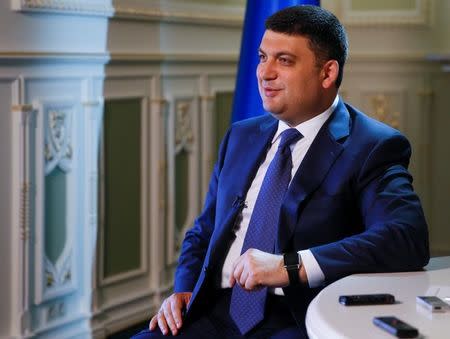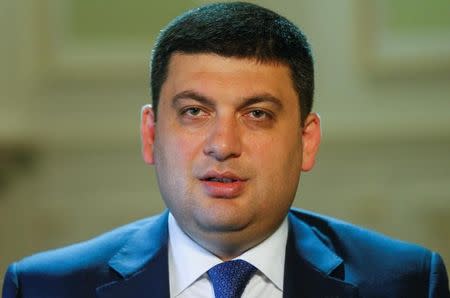I am my own man, says Ukraine's new prime minister
By Pavel Polityuk, Matthias Williams and Alexei Kalmykov KIEV (Reuters) - Ukrainian Prime Minister Volodymyr Groysman said on Friday he would not let his decision-making be shackled by powerful vested interests, allowing him to push through reforms and usher in a period of economic stability. In his first interview with foreign media since taking office in April, Groysman told Reuters he was confident of receiving a further installment of aid worth $1.7 billion from the International Monetary Fund, which is contingent on implementing reforms. He will travel to Washington in mid-June, with Ukraine having recently taken two major steps - freeing up gas prices and passing legislation to tackle corruption in the judiciary - under its commitments in a $40 billion international bailout deal. The appointment of Groysman, 38, ended months of political turmoil that had stymied policymaking. He had cut his teeth as Ukraine's youngest ever mayor, at 28, before becoming speaker of the rough-and-tumble parliament. Since the fall of communism, Ukraine's business oligarchs have frustrated efforts by a succession of governments to reform the economy, most recently in the form of changes promised by pro-Western leaders after street protests toppled the previous president in 2014. Asked if he could free himself from the oligarchs' influence, Groysman said: "I consider myself to be completely free in terms of my views and my decision-making." "I can be dependent only on Ukrainian society," he added. "We will fight for every reform, for every change, fight transparently." FIGHTING FOR EVERY REFORM Groysman took power with Ukraine just emerging from recession, still fighting a war against Russian-backed separatists in the eastern Donbass region and amid growing disillusion with the pace of change since the 2014 uprising. A ceasefire agreement negotiated by Ukraine, Russia and Western powers is barely holding, with each side accusing the other of failing to honour their promises. The IMF and Ukraine's other main backers - the European Union and United States - have also urged Kiev to speed up the reforms and tackling of endemic corruption. An agreement for more IMF aid had been derailed by the political turmoil in Kiev. An IMF mission visited in May for talks on a new memorandum, which is still being drafted, and the Fund is expected to decide on disbursing new aid in July. "During the last IMF mission, we had a constructive and frank discussion about the problems, and we found a common ground that allows us to move on," Groysman said. "I do not see anything that would prevent us to get (the next installment)," he added. "I am optimistic about our continued co-operation with the IMF." "We need to ensure macroeconomic stability," he said. "This requires fighting corruption with deregulation, privatisation, and an effective judicial system," he said. Once Ukraine returns to economic growth, which Groysman saw happening "very quickly", Ukraine and the IMF could even move to a "very different system of cooperation", he said, without specifying what the change would be. He also said Ukraine could soon expect to receive a $500 million loan from the World Bank to buy gas in exchange for certain conditions, including improving governance at state energy giant Naftogaz. Ukraine is expected to bypass Russia to purchase the gas, but Groysman did not completely rule out buying supplies from Russia's Gazprom, saying his government would take a "political decision" if Gazprom made the right offer. Ukraine's Western backers have praised the steps taken since Groysman came to power, and on Friday Washington signed a new loan guarantee agreement worth $1 billion. However, it has not all been plain sailing. Kiev has pledged to privatise hundreds of state-owned companies, but last week the IMF and the European Bank for Reconstruction and Development (EBRD) criticised the process. They complained to Groysman that the sale of the Odessa Portside Plant - seen as the first major test of Kiev's ability to attract foreign investment - fell short of international standards and could deter respectable investors. Groysman ruled out making any change to the reserve price of $521 million for the fertiliser plant, which the IMF and EBRD say is too high. "No. We have started this process and are interested in making it happen," he said. NO ELECTIONS AT GUNPOINT The Minsk ceasefire agreement to stop the violence in Donbass, which has already killed more than 9,000 people, requires Ukraine to hold local elections in the region and pass a law giving it greater autonomy. Meanwhile, the EU is due to decide within weeks whether to renew sanctions on Russia, imposed after Moscow's annexation of Crimea from Ukraine in 2014. Some countries in the bloc want them lifted. Asked whether Ukraine could hold elections in the Donbass region this year, Groysman said: "Here is the question to Russia: when they will meet their obligations? When will they withdraw their troops and withdraw fighters and mercenaries, and when do we regain control over the territory?" Elections are impossible "under the barrel of a gun", he said. Lifting sanctions, he said, would only reward Russian aggression. "I believe that the lifting of sanctions or easing of sanctions, is unacceptable for any civilised state because today Ukrainian soldiers are defending not only the borders of Ukraine - it is the eastern border of Europe." (editing by David Stamp)


